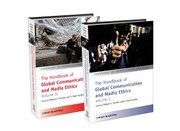Detailansicht
The Handbook of Global Communication and Media Ethics
eBook
ISBN/EAN: 9781444390605
Umbreit-Nr.: 3835581
Sprache:
Englisch
Umfang: 1040 S., 5.75 MB
Format in cm:
Einband:
Keine Angabe
Erschienen am 11.02.2011
Auflage: 1/2011
E-Book
Format: PDF
DRM: Adobe DRM
- Zusatztext
- This groundbreaking handbook provides a comprehensive picture of the ethical dimensions of communication in a global setting. Both theoretical and practical, this important volume will raise the ethical bar for both scholars and practitioners in the world of global communication and media.<ul><li>Selected by Choice as an Outstanding Academic Title for 2011</li><li>Brings together leading international scholars to consider ethical issues raised by globalization, the practice of journalism, popular culture, and media activities</li><li>Examines important themes in communication ethics, including feminism, ideology, social responsibility, reporting, metanarratives, blasphemy, development, and "glocalism", among many others</li><li>Contains case studies on reporting, censorship, responsibility, terrorism, disenfranchisement, and guilt throughout many countries and regions worldwide</li><li>Contributions by Islamic scholars discuss various facets of that religion's engagement with the public sphere, and others who deal with some of the religious and cultural factors that bedevil efforts to understand our world</li></ul>
- Kurztext
- InhaltsangabeNotes on Contributors ix <p>Preface xix</p> <p>1 Primordial Issues in Communication Ethics 1<br /> <i>Clifford G. Christians</i></p> <p>2 Communication Ethics: The Wonder of Metanarratives in a Postmodern Age 20<br /> <i>Ronald C. Arnett</i></p> <p>3 Information, Communication, and Planetary Citizenship 41<br /> <i>Luiz Martins da Silva</i></p> <p>4 Global Communication and Cultural Particularisms: The Place of Values in the Simultaneity of Structural Globalization and Cultural Fragmentation " The Case of Islamic Civilization 54<br /> <i>Bassam Tibi</i></p> <p>5 The Ethics of Privacy in High versus Low Technology Societies 79<br /> <i>Robert S. Fortner</i></p> <p>6 Social Responsibility Theory and Media Monopolies 98<br /> <i>P. Mark Fackler</i></p> <p>7 Ethics and Ideology: Moving from Labels to Analysis 119<br /> <i>Lee Wilkins</i></p> <p>8 Fragments of Truth: The Right to Communication as a Universal Value 133<br /> <i>Philip Lee</i></p> <p>9 Glocal Media Ethics 154<br /> <i>Shakuntala Rao</i></p> <p>10 Feminist Ethics and Global Media 171<br /> <i>Linda Steiner</i></p> <p>11 Words as Weapons: A History of War Reporting " 1945 to the Present 193<br /> <i>Richard Lance Keeble</i></p> <p>12 Multidimensional Objectivity for Global Journalism 215<br /> <i>Stephen J.A. Ward</i></p> <p>13 New Media and an Old Problem: Promoting Democracy 234<br /> <i>Deni Elliott and Amanda Decker</i></p> <p>14 The Dilemma of Trust 247<br /> <i>Ian Richards</i></p> <p>15 The Ethical Case for a Blasphemy Law 263<br /> <i>Neville Cox</i></p> <p>16 The Medium is the Moral 298<br /> <i>Michael Bugeja</i></p> <p>17 Development Ethics: The Audacious Agenda 317<br /> <i>Chloe Schwenke</i></p> <p>18 Indigenous Media Values: Cultural and Ethical Implications 342<br /> <i>Joe Grixti</i></p> <p>19 Media Ethics as Panoptic Discourse: A Foucauldian View 364<br /> <i>Ed McLuskie</i></p> <p>20 Ethical Anxieties in the Global Public Sphere 376<br /> <i>Robert S. Fortner</i></p> <p>21 Universalism versus Communitarianism in Media Ethics 393<br /> <i>Clifford G. Christians</i></p> <p>22 Responsibility of Net Users 415<br /> <i>Raphael Cohen-Almagor</i></p> <p>23 Media Ethics and International Organizations 434<br /> <i>Cees J. Hamelink</i></p> <p>24 Making the Case for What Can and Should Be Published 452<br /> <i>Bruce C. Swaffield</i></p> <p>25 Ungrievable Lives: Global Terror and the Media 461<br /> <i>Giovanna Borradori</i></p> <p>26 Journalism Ethics in the Moral Infrastructure of a Global Civil Society 481<br /> <i>Robert S. Fortner</i></p> <p>27 Problems of Application 500<br /> <i>P. Mark Fackler</i></p> <p>28 Disenfranchised and Disempowered: How the Globalized Media Treat Their Audiences " A Case from India 515<br /> <i>Anita Dighe</i></p> <p>29 Questioning Journalism Ethics in the Global Age: How Japanese News Media Report and Support Immigrant Law Revision 533<br /> <i>Kaori Hayashi</i></p> <p>30 Ancient Roots and Contemporary Challenges: Asian Journalists Try to Find the Balance 553<br /> <i>Jiafei Yin</i></p> <p>31 Understanding Bollywood 576<br /> <i>Vijay Mishra</i></p> <p> <i>Boniface Omachonu Omatta</i></p> <p>41 Authors, Authority, Ownership, and Ethics in Digital Media and News 802<br /> <i>Jarice Hanson</i></p> <p>42 Ethical Implications of Blogging 822<br /> <i>Bernhard Debatin</i></p> <p>43 Journalism Ethics in a Digital Network 844<br /> <i>Jane B. Singer</i></p> <p>44 Now Look What You Made Me Do: Violence and Media Accountability 863<br /> <i>Peter Hulm</i></p> <p>45 Protecting Children from Harmful Influences of Media through Formal and Nonformal Media Education 890<br /> <i>Asbjørn Simonnes and Gudmund Gjelsten</i></p> <p>46 Ethics and International Propaganda 911<br /> <i>Philip M. Taylor</i></p> <p>47 Modernization and Its Discontents: Ethics, Development, and the Diffusion of Innovations 932<br /> <i>Robert S. Fortner</i></p> <p>48 Communication Technologies in the Arsenal of Al Qaeda and Taliban: Why the West Is Not Winning the War on Terror 952<br /> <i>Haydar Badawi Sadig, Roshan Noorzai, and Hala Asmina Guta</i></p> <p>49 The Ethics of a Very Public Sphere: Differential Soundscapes and the Discourse of the Streets 972<br /> <i>Robert S. Fortner</i></p> <p>Index 991</p>
- Autorenportrait
- <p><b>Robert S. Fortner</b> is the Executive Director of the International Center for Media Studies (ICMS). He has published essays, papers and research reports for various scholarly and professional organizations, and has completed research for the Voice of America, the BBC World Service, Deutsche Welle, the Center for Strategic and International Studies and the Central Intelligence Agency.<br /><br /><b>P. Mark Fackler</b> is Professor of Communications Studies at Calvin College in Grand Rapids, Michigan. He is co-author of<i>Media Ethics: Cases and Moral Reasoning 8e</i> (2008) and<i>Good News: Social Ethics and the Press</i> (1993), among other works.</p>
